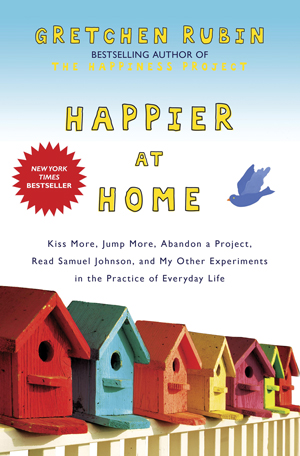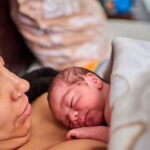Book Club: Happier at Home
This month’s Book Club selection comes from Gretchen Rubin, author […]

P&N: For those who may not have read your previous book The Happiness Project, or who may not be familiar with your blog, describe where the whole idea of starting both these projects came from.
GR: Well I got the idea for writing Happier at Home when I was standing in my own kitchen unloading the dishwasher. I could hear my husband in the next room—he was watching golf on tv—and my daughters were playing, and I was hit by this wave of homesickness, kind of like being at summer camp for the first time. It was the strangest feeling because I was right in the middle of my own home, yet I felt so homesick. And that feeling was so puzzling that it really made me focus for the first time on the idea of home as a framework to view happiness, because I’d been thinking and reading and writing about happiness for so long that I’d never really thought about home as an organizing principle. And once I did I just thought, well, so many elements of a happy life really are at home. And if you’re not happy at home it’s very hard to be happy. So I wanted to take some time and really see what realistic, manageable things I could do to make myself happier at home.
P&N: I love the way you organized Happier at Home in particular, how you looked at your home piece by piece sort of with a new eye. Which section of your home did you find the most difficult to tackle?
GR: That’s an interesting question. I mean it was specific resolutions that I found more challenging, like within my marriage chapter I worked on my fear of driving, which some people are like Why is your fear of driving related to your marriage, or even related to your home? To me it was my sense that I wasn’t pulling my weight, like my husband had to do too much and I should be contributing to the driving—not that we even drive that much living in New York—so that was really hard because I really do not like to drive. Now I’m better, but when I started it was really a major thing for me. So I would say of everything that I did, that was my least favorite undertaking. There were so many things that I loved and that I was thrilled to do, but that one I did not enjoy doing.
P&N: That was a really interesting aspect, and you’re right, I’m not sure the average reader would think that was related to being happier at home, but for you it was very important. And I like the way anyone could read that and get something out of it.
GR: Because people are afraid of swimming, public speaking, bike riding … There’s a lot of things—flying would be one—that other people find to be not challenging at all, it’s just part of their every day life, they don’t think anything of it. And that almost makes it worse, because you feel like nobody else has a problem with this. Why am I struggling with something that most people don’t even think twice about? A lot of people have something like that.
P&N: Of all the monthly projects—possessions and marriage and parenthood and body—was there one that, looking back now, made the biggest difference in your home life?
GR: Well, that’s hard to say. One of the things that was surprising to me, a small change that made such a gigantic change in the atmosphere of my home, was the resolution to give warm greetings and farewells. And this is something when your children are little you kind of take for granted, because they run to you and they are ecstatic when you get home and they cry when you leave, and it’s always a big deal when you come and go. But then when your children get older, everybody just takes each other for granted much more. And with your spouse it’s very easy to do that, just sort of grunt out a hello without looking up from your book or your laptop or whatever. And now we really make a big deal—you get your hello, you get your goodbye when you come and go, and it really makes a big difference; just the feeling of connection and engagement. And it doesn’t take any time, energy or money. It didn’t take any nagging for my family to get in the habit of it.
P&N: Do you think your family responded to you doing it, and just sort of followed suit?
GR: No, we all agreed. It’s the only resolution where we all agreed. My whole thing is that you don’t try to change other people, because you can’t. So don’t waste your breath. But this is the only resolution where I sat down and I said, “What do you think about us all making a resolution?” So we all talked about it, and we all agreed that we were going to do it differently.
P&N: I love the research you mention that showed that people who have ties to people represent them in concrete objects. Is there something—or things—you can name that are your favorite possessions, and are they tied to people that you love?
GR: Absolutely. In my family growing up, Christmas is a huge deal and we would get a special Christmas ornament that we would pick every year. So I have my Christmas ornaments that are really, really precious to me. Also, my collection of children’s literature books—and it has to be those ones. I hate it when I try to get a favorite book of mine and it has a different cover now. I hate the cover, I want the version that I had. So, my copies. The copy of The Lion, the Witch, and the Wardrobe that I had is super precious to me. And as I was writing the book I kind of had to battle the problem—and I think this is something that other people feel—anything that I associate with my children becomes precious. And you just can’t do that, because you cannot keep every cute little set of mittens that your children ever wore, “Oh I just remember them putting them on,” everything. And I couldn’t get rid of this: I have the little, tiny—my daughter was born early, so she was itty bitty—and I have the little, tiny newborn diaper (which was gigantic on her). I’m like, “I can’t get rid of the diaper, I have to have the little Pampers diaper.” So I kept it. A lot of it is making choices and saying something truly is precious, or saying something is just kind of associated with something that you find precious and so you need to be very diligent in finding the perfect thing. I can pick one outfit but I can’t pick 10 outfits, or one drawing but not 50 drawings, or three giant cardboard boxes full of finger paintings from preschool. They feel precious, but … it’s hard.
P&N: Similarly, is there a favorite place you have in your house, either now that you have gone through this project? A room that is your favorite place to be?
GR: Yes, my favorite room is this room that we have that’s got lots of bookshelves, a lot of comfortable seating, it’s got a TV—because I really do think if you want a room to be used the fact is it’s good to put a TV in it, sad to say—but it has tons of books. That’s where all my children’s literature books are. I love miniatures, so I have a set of miniature things there, in the secret place (In the book I describe how we have a secret place in our apartment. Actually we have a couple secret places!) My favorite secret place is in that room. So to me, this room is—and it’s also this dark purple—everything about it: it’s small and cozy, it’s got a lot of great places to read, it’s got this little table that makes a great desk—you can do anything in there. That’s my favorite place. Especially in the winter because it’s very cozy. In the summer it’s kind of dark, but in the winter it’s super, super cozy.
P&N: What do you think would be different about this book if you had written it when you were starting out as a parent and were taking care of babies? What would you tell yourself—your young mom self as you now—what would you tell yourself back then?
GR: The one thing I would say to your readership, the one thing they should take away from this is to make sleep the priority above all priorities. I really think that a lot of the things that happen when you have a newborn, or the first couple years, are because you are so sleep deprived. I saw this with my sister. My sister is a full time writer—she’s a TV writer—and when she had her baby, she said, “All right, I’ll get up in the middle of the night and you sleep because you’ve got to go to work,” but it doesn’t work like that. That’s like saying “I’ll eat half as much because you’re going to work.” You don’t get to pick how much sleep you need. You have to get that sleep. And you need more sleep because you’re drained, and you’re overwhelmed, and who knows what’s going on with your body. And I just think you need to work it out with your partner or whoever else you have in your life, you have to get enough sleep. I remember a friend of mine saying, “I was so sleepy I didn’t even want to go to sleep because it was such torture to have to get up, I just wanted to stay awake.” And another friend of mine saying “I was standing in front of the refrigerator and I ate an entire carton of Ben & Jerry’s ice cream because I was so desperate to somehow give myself some energy,” and of course it didn’t work. You really need to think about it, because people sort of kid themselves that their body will make the best of it. It doesn’t work like that, and there’s study after study showing it affects you in so many ways. And I know you have one that needs to get to nursery school, when you have a baby, so how do you do that? You just have to really think about it hard and make it a huge priority because it is not something that will just work itself out. I think the weight gain that people find, and the depression that they feel, the feeling of being overwhelmed … it’s hard to have a new baby. It’s a really challenging time. And it’s an issue, you’re like, “Why is it so hard to have a baby that sleeps 20 hours a day and yet I haven’t had a shower in three weeks?” I totally remember that, so get enough sleep.
The other thing, though, that I would say—somebody told me this and I am so grateful, it made such a difference to me—is to be sure to have professional pictures taken of your children if you can possibly afford it. And it’s really true. Like the snapshots, we take so many photographs now, and at the time your photograph looks as good as a professional photograph, but 10 years later, for whatever reason, a professional photograph looks a lot better. And then you go out of your way to frame it and put it on nice paper and really make something out of it. When my sister had her baby, because I’d already had two children myself, I said, “Get professional photographs taken with your newborn. You will feel like he’s going to be a newborn forever, but it will pass in a flash and you will never ever again have that precious moment of that teeny tiny baby. And be in the picture yourself, even though you feel like you look like a mess.” She just told me the other day she’s so happy she has those pictures. Because it feels like it’s so intense, but it’s true: the days are long but the years are short. The days feel so long, you think you’re going to have a newborn baby forever, but this is the thing with childhood, every stage passes in a flash. And everything that drives you crazy—I mean, my daughter had tantrums, that is bad, but you know, she outgrew them—if there’s something you don’t like, or even something that you love, it’s going to come and it’s going to go, so to really appreciate the season of life that you’re in, which is hard. I find that hard all the time. Like, what is it like to have a 7-year old?
P&N: Everything in your marriage chapter—which I thought was really poignant—about your pre-children marriage, and wondering what you did with all your time then, so many couples must think that, postbaby. Like, “We had mounds of time, what did we possibly do with ourselves?”
GR: I was talking to a college student recently and they said to me, “I’m too busy to exercise,” and I was like “Excuse me while I laugh in your face, because you have nothing but time. Do a timeline for yourself, and I think that you will find you have time to go for a twenty minute walk, come on.” But that’s the weird thing about activities is that they fill the time. I’ve been thinking about that a lot for my next book. Oh, I’m so excited about this book.
P&N: Yes, tell us what you have coming up!
GR: It’s going to be a book about habits. Because I realized that habits are like a prequel to a happy life, because if you have good habits it is so much easier to have a happy life. If you have bad habits, or no habits, then you’re making things harder for yourself. So by tackling habits you really set yourself up better. I’ve been thinking a lot about what you can make into a habit and what the pros and cons of habits are and how you create a habit. It’s fascinating.







